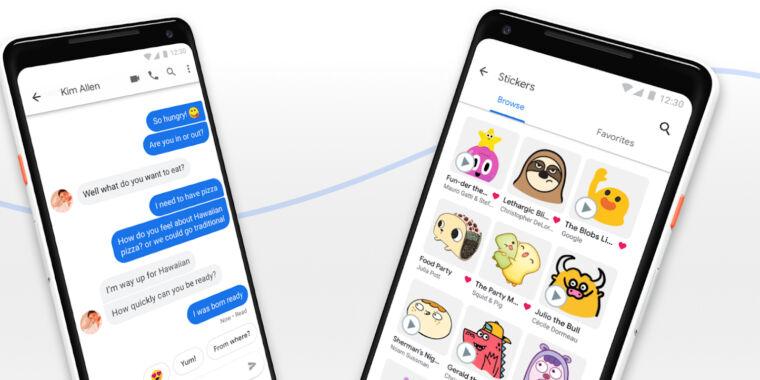The biggest wireless network operators in the US announced in 2019 that they would jointly launch a Rich Communications Services (RCS) messaging app sometime in 2020.
Under the auspices of their new Cross Carrier Messaging Initiative (CCMI), the companies said in late 2019 they would use vendor Synchronoss Technologies to handle the technological logistics of the effort. And in May 2020, Synchronoss said "we continue to believe the RCS-based advanced messaging service will be launched by the CCMI joint venture in 2020."
But it was not to be.
"While we're not at liberty to speak on behalf of CCMI and no launch date for the service has been formally announced, Synchronoss is continuing to move forward with preparations and look forward to helping bring RCS-based messaging to US subscribers," the company said in response to questions from Light Reading.
Verizon was a bit more blunt: "The owners of the Cross Carrier Messaging Initiative decided to end the joint venture effort. However, the owners remain committed to enhancing the messaging experience for customers including growing the availability of RCS," the operator said in a statement to Light Reading.
The development really comes as no surprise.
"The [RCS] market has been impossibly slow for a decade now," analyst Lynnette Luna of GlobalData told Light Reading. Luna wrote a report on RCS in the US in June 2020 and has not seen a reason to update it yet.
RCS first surfaced more than a decade ago, when the GSMA was marketing it under the Joyn brand. The hope was that operators from Vodafone and Verizon would use RCS to create all sorts of interoperable multimedia features similar to Facebook's WhatsApp.

And though the technology appears to have gained some traction in select locations like Japan, it remains a dud in the US.
"We're committed to delivering RCS interoperability and are working with other providers to make it happen," T-Mobile said in response to questions from Light Reading. "T-Mobile customers with Android devices can currently enjoy RCS messaging across our network as well as with many other customers worldwide by interoperating with Google."
Indeed, T-Mobile is perhaps the only US operator that has made any RCS noise since the formation of the CCMI in 2019. The operator first launched RCS in 2015 with vendor Mavenir, and in 2020 it announced a deal with Google to deliver RCS to its Metro by T-Mobile prepaid customers.
Then, in March 2021, T-Mobile said it reached an agreement with Google to make Google's Messages the default messaging app on all its Android devices. According to executives familiar with the situation, T-Mobile's move was designed to eliminate handset-specific messaging clients like Samsung Messages. Google's Messages app will still connect to T-Mobile's RCS services operated by Mavenir.
That's noteworthy considering T-Mobile US accounted for fully 40% of Mavenir's revenues in 2020.
"The recent announcement of the T-Mobile and Google cooperation is great news for RCS adoption and its consolidation as the next generation mobile messaging standard. By adding Android Message support, T-Mobile is extending reach and adding more RCS users to their network, without having to depend on the update roadmap of smartphone manufacturers. This is also great news for Mavenir's RCS footprint expansion in the US as the top three mobile network operators (MNOs) are using Mavenir's RCS technology in their networks," Guillaume Le Mener, head of RCS at Mavenir, told Light Reading in a statement.
He continued: "The leading US MNOs have either completed or in the process to complete RCS interconnection among themselves, as well as connection with the rest of the world's RCS users. New announcements on RCS availability from the different MNOs are expected, demonstrating that RCS is a reality and continues to grow."
GlobalData's Luna explained that Google continues to push RCS in the US and elsewhere in the hopes that it will be able to make money from business-to-person advertisements. That's not a surprise given the performance of such services in countries like Japan. According to Synchronoss, Japanese consumers open about 85% of RCS messages and click on around 60% that's significantly better than the 0.001% of users who click on mobile banner ads.
"RCS is really important to Google," Lune said. She said though that RCS in the US and elsewhere has suffered from a "chicken and egg problem" wherein operators aren't supporting the service because customers aren't using it, and vice versa.
Of course, there's one more major obstacle facing RCS: iPhone maker Apple does not support it, and Apple commands roughly half the US smartphone market.
"That's always been the Achilles heel of RCS," Luna said. However, she said the service could receive a boost from 5G, which requires operators to install IMS (IP Multimedia Subsystem) technology that makes RCS interoperability easier to implement.
But Luna isn't holding out much hope for a major RCS push by US operators like T-Mobile, Verizon and AT&T, which are all in the process of expanding their 5G networks. Indeed, AT&T officials did not respond to questions from Light Reading about their RCS efforts.
Related posts:
Mike Dano, Editorial Director, 5G & Mobile Strategies, Light Reading | @mikeddano
